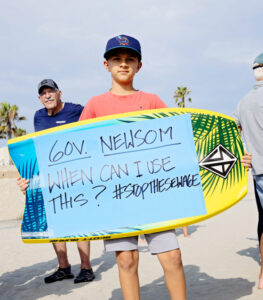
Months after San Diego County asked the governor to declare the Tijuana sewage crisis an emergency, the governor’s office has deemed such a proclamation “unnecessary.”
However, Governor Gavin Newsom has written to President Joe Biden requesting more funding to stop the millions of gallons of untreated sewage and trash that flows from Tijuana into the Pacific Ocean each day.
A state-level proclamation of emergency is used to suspend state laws that prohibit actions needed to address a crisis, but there are no state laws impeding the rehabilitation of the crumbling infrastructure on both sides of the border, a representative of the governor said.
“In this context, where federal entities are responsible for the wastewater facility, these state powers are inapplicable,” said David Sapp, legal affairs secretary for the governor, in a letter to the California Coastal Commission. “A state proclamation of emergency cannot accelerate federal work needed on this federal facility that is in a federal-controlled area on an international border.”
However, Sapp said, Newsom has taken appropriate actions against the crisis, including his efforts to secure more federal funding to address problems along the border.
“This is in addition to the substantial enforcement actions that state agencies have taken in response to the crisis, including most recently a Notice of Violation issued by the San Diego Regional Water Quality Control Board to the U.S. International Water Boundary and Water Commission on Sept. 5,” Sapp’s letter reads.
The USIBWC outlined its plan for coming back into compliance during an Oct. 11 meeting of the California Coastal Commission, but the problem – as it often does – comes back to funding.
“We are holding ourselves accountable,” said Dr. Maria-Elena Giner, USIBWC commissioner said. “We agree that it’s unacceptable that you do not have access to your beaches, it is unacceptable that you cannot use the public amenities of the estuary and the health impacts associated with that.”
After a three-hour field trip to the Tijuana River Valley and hours of public comment recounting the ways coastal communities are impacted – both in terms of health and economic impact – the Coastal Commission opted to consider asking the federal government for assistance at its next meeting.
The meeting was peppered with both data and anecdotes outlining the severity of the problem and its adverse impact on community health. Bacteria does not just come from contact with the water but also from breathing coastal air: As surf pounds beaches, bacteria in the water is aerosolized.
Kimberly and Matthew Dickson, doctors and owners of an urgent care facility in Imperial Beach, said after Tropical Storm Hilary, their facility saw an average of 35 people per week for diarrhea, compared to a baseline of five. Heavy rain exacerbates sewage flow.
The United States appropriated $330 million in this year’s budget to address the issue, with another $144 pledged from Mexico. In September, the federal government announced an additional $350 that is anticipated.
One challenge officials have faced is that the USIBWC cannot legally accept funding from government agencies or private parties with Congress approving it, so obtaining funding is difficult but needed. Until this year, for example, the USIBWC’s entire budget for plant operations was $50 million, and the agency oversees infrastructure across the entire U.S.-Mexico border.
Fully funding repairs and requisite expansion of sewage treatment infrastructure is estimated at up to $1 billion.
The number is not stagnant; earlier this year, officials discovered that the South Bay International Wastewater Treatment Plant needed an unexpected $150 million in additional rehabilitation, and then Tropical Storm Hilary rendered damage, at a cost of $8 million from the USIBWC’s budget.
The Coastal Commission will meet again next month to discuss an appeal to the federal government.




